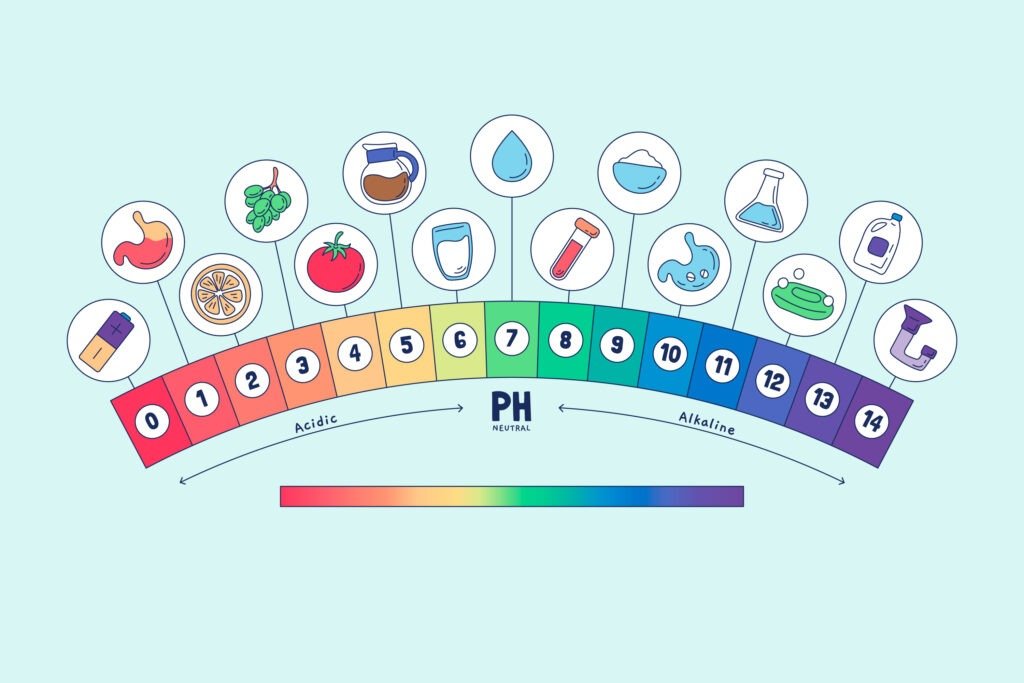Body pH Levels and Chronic Illness symptoms are connected. Maintaining the right body pH levels is crucial for overall health, affecting metabolism, immune function, and energy regulation. While pH balance is often overlooked in chronic illness discussions, it plays a significant role in symptoms like fatigue, inflammation, digestive issues, and muscle function. Understanding how pH imbalance influences the body can help individuals with chronic conditions make informed decisions about nutrition, hydration, and symptom management.
Your body naturally maintains a slightly alkaline blood pH between 7.35 and 7.45, ensuring proper enzymatic and cellular functions. However, different organs and systems operate under varying pH conditions.
Natural pH Levels in Different Body Systems
- Blood: Slightly alkaline (7.35–7.45)
- Stomach Acid: Highly acidic (1.35–3.5) to aid digestion
- Skin: Mildly acidic (4.1–5.8) for microbial protection
- Urine: Varies based on diet and hydration (4.5–8.0)
Even small fluctuations in pH balance can disrupt normal biological functions, leading to fatigue, brain fog, joint pain, and digestive discomfort.
What is your favorite recumbent exercise?
How pH Imbalance Affects Chronic Illness Symptoms
An imbalance in body pH—whether too acidic (acidosis) or too alkaline (alkalosis)—can exacerbate chronic illness symptoms, making management more difficult.
Acidosis and Its Effects
When the body becomes too acidic, it struggles with inflammation regulation, oxygen transport, and cellular recovery.
- Fatigue and brain fog – Impaired oxygen uptake reduces mental clarity.
- Joint pain and stiffness – Excess acidity aggravates inflammation.
- Digestive discomfort – Acid reflux and bloating worsen with acidic imbalances.
Alkalosis and Its Effects
If the body shifts too far toward alkaline levels, nerve and muscle function may suffer.
- Muscle cramps and weakness – Electrolyte imbalances trigger spasms.
- Dizziness and numbness – Reduced carbon dioxide levels disrupt circulation.
- Calcium depletion – Excess alkalinity interferes with bone and joint health.
Maintaining a balanced pH range supports immune function, digestion, and energy levels, making it an essential aspect of chronic illness management.

Optimizing pH Balance for Health
Addressing pH imbalances requires a combination of hydration, nutrition, and lifestyle adjustments to stabilize body function.
Hydration and Electrolyte Regulation
Water intake directly impacts pH balance and helps maintain circulatory stability.
- Drink alkaline or mineral-rich water for optimal hydration.
- Ensure balanced electrolyte intake (sodium, potassium, magnesium) to regulate muscle and nerve function.
Diet Strategies for pH Balance
Eating the right foods can help maintain acid-alkaline homeostasis, reducing symptom severity.
- Increase alkaline foods: Leafy greens, nuts, citrus fruits, and plant-based proteins.
- Limit processed foods and sugars: Excess acidity strains cellular metabolism.
- Consume fermented foods: Probiotics improve gut health, aiding digestion.
Breathwork and Stress Management
Stress contributes to acidic imbalances by increasing cortisol production, which drains energy reserves.
- Deep breathing techniques help regulate oxygen and CO2 levels, promoting better pH balance.
- Meditation and mindfulness reduce stress-induced acidity.

GnarlyTree | CONNECTED CONDITIONS
Small Fiber Neuropathy and POTS | Understanding the Connection
Small Fiber Neuropathy (SFN) is emerging as a critical piece of the puzzle for many people living with Postural Orthostatic Tachycardia Syndrome (POTS). While POTS is often discussed in relation to Ehlers-Danlos Syndrome (EDS), SFN...
Frequently Asked Questions
What is the ideal pH level for the human body?
The body’s blood pH should stay between 7.35 and 7.45, while different organs have varied pH needs for function.
How does pH imbalance affect fatigue in chronic illness?
Acidosis can worsen fatigue, brain fog, and inflammation, while alkalosis may trigger muscle weakness and dizziness.
Can diet influence body pH balance?
Yes, acidic foods can contribute to inflammation, whereas alkaline foods support energy metabolism and symptom relief.
Does hydration affect pH levels?
Proper hydration, including balanced electrolyte intake, supports blood pH stability and circulation regulation.
What are signs of acidosis?
Common symptoms include chronic fatigue, digestive discomfort, joint pain, and increased inflammation.
How do breathing techniques help pH balance?
Breathwork regulates oxygen and CO2 levels, preventing acid buildup caused by stress or poor circulation.
Should I take alkaline water or supplements?
While alkaline water can help balance minor pH fluctuations, overall nutrition and hydration strategies matter most.
Why is pH balance important for people with chronic illness?
Maintaining optimal pH helps reduce inflammation, fatigue, digestive strain, and electrolyte imbalances, improving overall symptom management.
Final Thoughts
Balancing body pH levels plays an essential role in chronic illness management, influencing everything from circulation and digestion to energy stability and immune function. While pH regulation is often overlooked, it affects inflammation control, muscle health, and recovery processes. By focusing on hydration, nutrient-dense foods, and stress management, individuals can optimize their pH balance, reducing symptom intensity and improving overall well-being.
What is your biggest challenge with staying hydrated?



